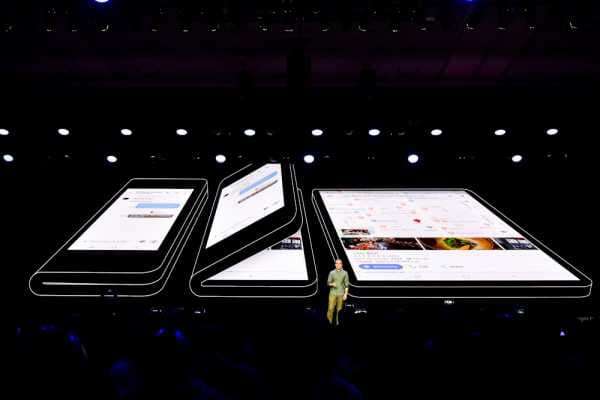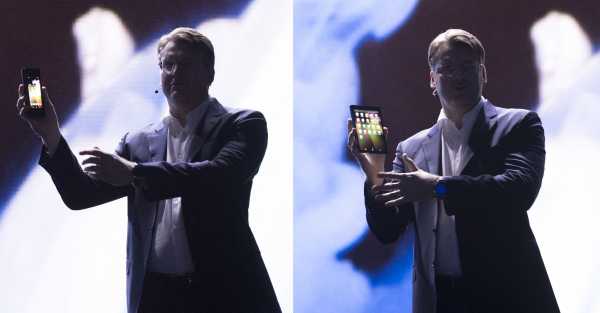

Samsung is making a giant phone that folds in half and costs $1,770. Reportedly called the Galaxy F, it’s set for release in March of next year, and the company plans to sell a million of them in 2019.
The phone is basically a tablet, which folds into a phone, and reportedly opens with the same satisfying “click” as the flip phones of yore. But why?
Wired’s Brian Barrett traced the history of foldable smartphone technology in an expansive report over the weekend, writing, “The scenarios are enticing: You keep your smartphone in single-screen mode on the way to the subway to check in on Twitter, then unfold it to tablet size once you’re on the train to read The New York Times. The appeal is obvious enough that one wonders why it took so long.”
Is that scenario enticing? Is the appeal obvious enough? Maybe I’m missing something here, but that scenario seems at best like something that could … happen and I wouldn’t scream. If I saw a phone fold out into a tablet on a train I’d be like, “Fine.” It’s just a thing, as are newspapers and our current selection of phones. As are “improvements” in yogurt container design and “cutting-edge” technology in sneakers.
(And not to overstep, but I don’t even recommend looking at Twitter or the New York Times during your commute, particularly given how often both feature information about how the technology of the subway has evolved to the point of barely working at all.)
Is that scenario enticing? Is the appeal obvious enough?
At first glance, this phone looks like iteration for iteration’s sake — an expensive device designed to entertain people who are lightly bored with the perfectly acceptable functionality of the expensive devices they already own. Something to be debated on gadget blogs and on Reddit and to end up in the hands of people who value impressing others with party tricks that have nothing to do with their own skills or personality.
Case in point: The original concept for the phone was teased in a baffling trailer shown at the company’s CES presentation in 2013, which I encourage you to watch in full. It features a young woman, drinking her espresso, unimpressed by a man wearing lots of ugly gadgets, and interested in making out with a man wearing a white T-shirt (the classic, best look for men, I can admit!) and holding a Samsung foldable phone. This foldable phone is so novel and useful, it makes him hot!
To be fair, phones are boring. Do you look at your phone and get misty-eyed thinking about the possibilities of the future? No, you look at your phone and think, “Oh thank God, another push alert. I no longer have the ability to remember to do anything — including basic tasks of staying alive — without an external stimulus.”
Maybe this boredom is why, according to Patrick Moorhead, an industry analyst and former tech executive, told The Verge last week, “Few are debating ‘if’ foldable or rollable mobile displays are the future of smartphones, the only question is when and by whom.”
Samsung’s not that far out ahead of the competition; the small Chinese gadget-maker Royole released a foldable smartphone called the FlexPai just last week, which admittedly looks like a binder and has been summarily dismissed as clunky and bad, but nevertheless, existed before Samsung’s Galaxy F. So did ZTE’s Axon M, which is “foldable” in that it is basically two phones connected by a hinge. Motorola is planning a loose remake of its wildly popular early aughts flip phone, the RAZR. LG, Huawei, and even Apple have all filed patents for a foldable smartphone screen of one kind or another.
According to The Verge’s Tom Warren, “Samsung’s first device won’t completely capture the design’s potential — instead, it’ll mark the beginning of an emerging battle over this intriguing display technology.” He continued, “It sounds unbelievable right now, but we’re only at the very beginning of our flexible future.”

Warren also reported from the first live demo of Samsung’s folding phone concept, where the phone was shown off mostly in the dark and in an odd case:
Samsung refuses to say how they made an OLED screen that can bend without deteriorating, which is no small task. Assuming the screen is made of some kind of plastic, instead of the glass you’re used to, it will probably scratch a lot easier than the phone you have now. But if Samsung can perfect it, they can probably get other manufacturers to buy their screens from them instead of developing their own, and recoup some of the cost of setting up a whole new manufacturing arm.
That was also pretty much the motivation of companies like Qualcomm, which jumped on the 3D TV and gaming trends a few years back in an effort to sell more specialty high-powered processors. That didn’t go well, as you probably know, since you don’t watch 3D TV. The Wall Street Journal’s Christopher Mims recently put it succinctly on Twitter: “Folding phones are the 3D TV of the mobile world.”
“Books fold because that’s a good way to pack pages into them, which is necessary because paper doesn’t scroll,” Mims continued. “Phones fold because…?”
Regardless, the hype is off to the races. In the Android subreddit, a veritable squabble has broken out. “I feel like this will be excessively thick and uncomfortable to hold,” says one commenter, only be to dismissed by others writing, “I’d prefer 1000x more having a thick heavier phone with more battery or screen real estate than having a paper-thin shit phone” and “Is this question going to be asked in literally every thread about this phone?”
One particularly popular rebuttal: “It reminds me of people talking about the iPhone before it came out. And look what happened.”
Sourse: vox.com